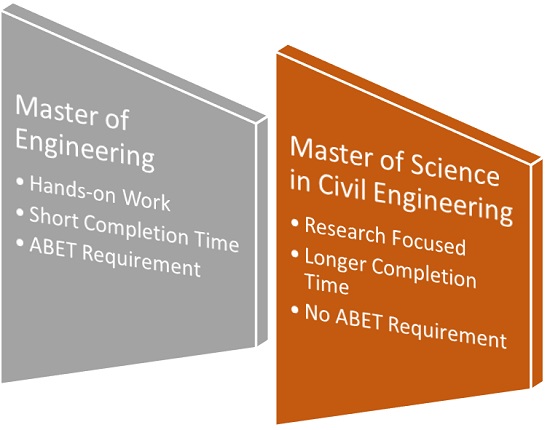Once you decide to earn your master’s degree in civil engineering, one of the highest paying master’s degrees, you have another choice to make. Should you choose a program with the Master of Engineering title or the Master of Science degree title? Graduate degrees in civil engineering come in both varieties, and different engineering schools have slightly different ways of structuring the curriculum and course requirements of their programs. Generally, though, the biggest distinctions between a Master of Engineering (MEng) degree and a Master of Science degree are differences of emphasis, completion time and entrance requirements.
Emphasis on Coursework and Practical Application vs. Research
Arguably the most important difference between a Master of Engineering and a Master of Science degree is one of focus. A Master of Science degree is traditionally a research-based degree, while a Master of Engineering is a professional degree that emphasizes practical application of technical skills.
Students might complete the same number of graduate-level college credits for either degree, but the Master of Science degree typically incorporates more research into the curriculum. While this focus on research is most evident from the thesis requirement that you will find in most Master of Science in Engineering programs, research may also be embedded into the curriculum in other ways. Master of Engineering programs may instead involve hands-on work in a different capacity, such as a graduate internship or a design project completed independently or in collaboration with an industry partner.
Don’t mistake a Master of Science as an impractical degree exclusively for academia. Civil engineers often go on to work in industry roles with an M.S. degree. Some research-focused programs make a point to build leadership and other practical skills into the curriculum.
Time to Degree Completion
If your main motivation for earning a master’s degree is to gain the advanced skills and specialized knowledge to excel in your job or advance to a new one, you’re probably more eager to be done with school. Many professional Master of Engineering programs are meant to be completed faster, often in as little as one year of study, so you can get to work sooner.
Master of Science programs, on the other hand, are more likely to take longer. That is partly because the original research needed to develop a thesis takes longer. Students who really want to delve into research in civil engineering are also more likely to be comfortable spending more time in school to do so than students who just want to prepare for their next career move.
Although one extra year of school shouldn’t be what makes your decision, it’s a significant factor that may restrict your geographical location and work opportunities. Students also have to weigh the added tuition cost and how an extra year of study will impact their lives.
Entrance Requirements
Another area where Master of Engineering and Master of Science programs in engineering tend to divide is the requirements needed for admission to the program, although this aspect varies by school. Often, you need to have earned your bachelor’s degree from a program accredited by ABET, the Accreditation Board for Engineering and Technology, to get into a Master of Engineering program.
Part of the reason ABET accreditation is so important for getting into this specific engineering degree program is because you need to have plenty of hands-on engineering experience to succeed in a program that emphasizes deepening your engineering skills. Experimental experience and engineering design experience are among the criteria ABET uses to award accreditation to engineering programs.
Students without an ABET-accredited bachelor’s degree will have an easier time getting into a Master of Science program in engineering, generally. This includes engineering majors whose undergraduate institutions were not ABET-accredited, as well as students coming from different academic backgrounds outside of engineering.
Each engineering school and program sets its own admissions requirements, so don’t take for granted that you will be able to get into any M.S. degree without an ABET-accredited bachelor’s degree. Having ABET accreditation at the bachelor’s level is still beneficial.
Similarities Between Master of Engineering and Master of Science in Engineering Programs
IMAGE SOURCE: Pixabay, public domain
In the most important ways, Master of Engineering and Master of Science in Engineering degrees are very much alike. Both programs of study are graduate-level programs. The coursework in either type of degree program encompasses advanced study in engineering, and students of both kinds of programs may have opportunities for specialization. Employers in the field of engineering look favorably upon both types of programs, and students can land an industry role with either a Master of Engineering or Master of Science degree in civil engineering.
If you aspire to earn a Ph.D. or work in academia, you would be better off with a Master of Science in engineering degree. Students eyeing industry leadership roles can conceivably attain these roles with either degree, but the practical Meng may command a better salary.
Additional Resources
What Degree Do You Need to Be a Civil Engineer?
What Are the Benefits of Pursuing a Degree in Civil Engineering?
What Classes Will I Have to Take for a Degree in Civil Engineering?


